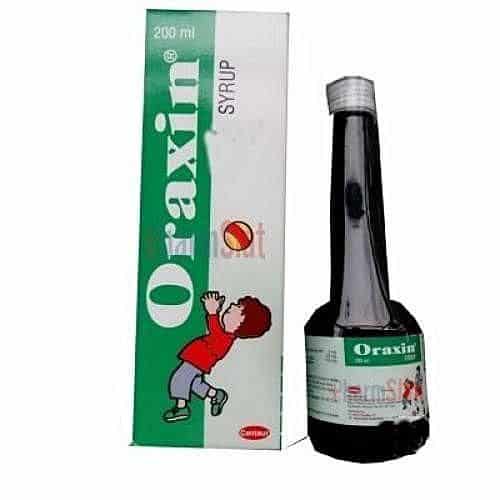Promethazine DM is a combined medication comprising promethazine and dextromethorphan. It provides temporary relief from allergy and common cold symptoms and is specifically sanctioned for use in adults and children aged 2 years and above.
It is not recommended for children under 2 years old due to the potential for significant harm in this age category. Administration is typically oral, with a usual frequency of every 4 to 6 hours. Common side effects of promethazine DM encompass drowsiness and stomach upset.
Uses
This combination medication is employed for the temporary alleviation of runny nose, coughing, and sneezing induced by the common cold, allergies, hay fever, and other respiratory ailments. Promethazine, classified as a phenothiazine, functions as an antihistamine by obstructing the effects of histamine, a natural substance responsible for allergy symptoms, while also exhibiting a drying effect. Dextromethorphan, belonging to the cough suppressant class, acts on the cough center in the brain to diminish the urge to cough.
Typically, this product is not intended for persistent coughs associated with smoking or long-term respiratory issues (such as chronic bronchitis, emphysema) unless directed by a physician. It's noteworthy that cough-and-cold products have not demonstrated safety or efficacy in children under 6 years old. Consequently, refrain from using this product to address cold symptoms in children under 6 years, unless specifically advised by a doctor. Some formulations (e.g., long-acting tablets/capsules) are not recommended for use in children under 12 years old. Consult your doctor or pharmacist for more information on the safe use of your specific product.
It's important to recognize that these products do not cure or shorten the duration of the common cold and may entail serious side effects. To minimize the risk of such effects, adhere closely to all dosage instructions. Avoid using this product to induce drowsiness in a child and refrain from administering other cough-and-cold medications that may contain similar ingredients (refer also to the Drug Interactions section). Seek advice from your doctor or pharmacist regarding alternative methods to alleviate cough and cold symptoms, such as ensuring adequate fluid intake, using a humidifier, or employing saline nose drops/spray.
How to use Promethazine Dm Syrup
Administer this medication orally with or without food, following your doctor's guidance, typically every 4 to 6 hours as necessary. Due to potential variations in dosing recommendations, diligently adhere to your doctor's instructions regarding the use of this medication.
The prescribed dosage is determined by factors such as your age, medical condition, and response to treatment. Employ a specialized measuring device/spoon to accurately measure the dose; refrain from using a household spoon, as it may result in an incorrect dosage.
Ensure adequate fluid intake while using this medication, unless instructed otherwise by your doctor. The increased fluid consumption aids in loosening mucus in your lungs.
Misuse or improper use of this medication can lead to severe consequences, including brain damage, seizures, or even death. Avoid escalating your dose, increasing frequency, or prolonging the duration beyond the directed timeframe.
Inform your doctor if your cough persists, recurs, or intensifies after 7 days, or if it is accompanied by an enduring headache, persistent fever, severe sore throat, or the development of a rash.
Read Also: TCL 341 Pill | Uses, Side Effects, and More
Pros and Cons of Promethazine DM
Pros
- Symptom Relief
- Antihistamine Properties
- Cough Suppression
- Oral Administration
Cons
- Age Restrictions
- Drowsiness and Dizziness
- Overdose Risk
Differences Between promethazine dm and amlodipine
Promethazine DM
It is a combination medication used to temporarily treat symptoms of the common cold, allergies, and respiratory illnesses. It contains promethazine, an antihistamine, and dextromethorphan, a cough suppressant.
Amlodipine
It is a calcium channel blocker used to treat high blood pressure (hypertension) and certain types of chest pain (angina).
Alternative to promethazine dm
Antihistamines
- Examples: Loratadine, cetirizine, fexofenadine.
- Purpose: These medications can help relieve allergy symptoms, including sneezing, itching, and runny nose.
Side Effects
Possible side effects of this medication may include drowsiness, dizziness, blurred vision, nausea, constipation, or dry mouth. If any of these effects persist or worsen, promptly inform your doctor or pharmacist.
To mitigate the risk of dizziness and lightheadedness, take caution when transitioning from a seated or lying position to standing up.
If you experience excessive sleepiness or difficulty waking up after using this medication, discontinue its use and promptly consult your doctor or pharmacist. Adjustments to your dosage may be necessary.
It's important to remember that your doctor prescribed this medication because they assessed that the benefits outweigh the potential side effects. Many individuals using this medication do not experience serious side effects.
Contact your doctor immediately if you encounter any severe side effects, including decreased coordination, difficulty urinating, trembling (tremor), changes in mental/mood states (such as nervousness, excitement, irritability, confusion, hallucinations), uncontrolled movements (such as fixed upward stare, neck twisting, tongue movements), slow heartbeat, or fainting.
Seek immediate medical assistance if you observe very serious side effects, such as slow/shallow breathing or seizures.
In rare instances, this medication may lead to a severe condition known as neuroleptic malignant syndrome (NMS). Seek urgent medical attention if you manifest symptoms such as fever, muscle stiffness/pain/tenderness/weakness, profound fatigue, severe confusion, sweating, fast/irregular heartbeat, dark urine, or signs of kidney problems (such as changes in urine volume).
While uncommon, a severe allergic reaction to this drug may occur. If you notice symptoms like rash, itching/swelling (especially of the face/tongue/throat), severe dizziness, or difficulty breathing, seek immediate medical help.
This list does not encompass all possible side effects. If you observe other effects not mentioned here, contact your doctor or pharmacist.
Warnings
Promethazine is contraindicated for use in children under 2 years old due to the potential risk of causing serious, and possibly fatal, slow/shallow breathing. Instances of this problem have been reported even with normal doses in this age group. It is crucial to administer the lowest effective dosage, and the use of other medications that impact breathing should be avoided. If slow/shallow breathing occurs, seek immediate medical assistance.
Additionally, Promethazine should not be used in children with liver disease, including the potential for Reyes syndrome. Reyes syndrome is a rare but severe condition that can affect various organs, particularly the liver and brain. It is important to adhere to these guidelines to ensure the safety and well-being of the child.
Overdose
If someone has overdosed on this medication and is experiencing serious symptoms such as loss of consciousness or difficulty breathing, it is imperative to call 911 immediately. Alternatively, contact a poison control center promptly. In the United States, residents can reach their local poison control center at 1-800-222-1222, while Canada residents should call a provincial poison control center. Symptoms of overdose may include severe drowsiness, an inability to wake up, slow/shallow breathing, slow heartbeat, hallucinations, and seizures.
Important notes to consider:
Do not share this medication with others
It is prescribed specifically for your current condition, and using it for another condition without your doctor's guidance may be inappropriate. In such cases, a different medication may be necessary.
Missed Dose
If you are on a regular medication schedule and miss a dose, take it as soon as you remember. However, if it's close to the time of your next dose, skip the missed one and resume your regular schedule. Avoid doubling the dose to compensate.
Storage
Keep the medication at room temperature, away from light and moisture. Do not store it in the bathroom. Ensure that all medications are stored out of reach of children and pets.
Disposal
Do not flush medications down the toilet or pour them into drains unless instructed to do so. Dispose of the product properly when it is expired or no longer needed. Consult your pharmacist or local waste disposal company for guidance on how to discard it safely.
Conclusion
It is vital to exercise caution and adhere closely to prescribed guidelines when using Promethazine. The potential for serious side effects, especially in specific age groups such as children under 2 years, underscores the importance of strict adherence to dosage recommendations. If an overdose is suspected or severe symptoms occur, immediate medical attention is crucial.
It is essential to refrain from sharing this medication with others and to use it only for the prescribed condition. Additionally, managing missed doses responsibly and storing the medication appropriately contribute to its safe and effective use. By following these guidelines and seeking prompt medical assistance when needed, individuals can maximize the benefits of Promethazine while minimizing potential risks.



